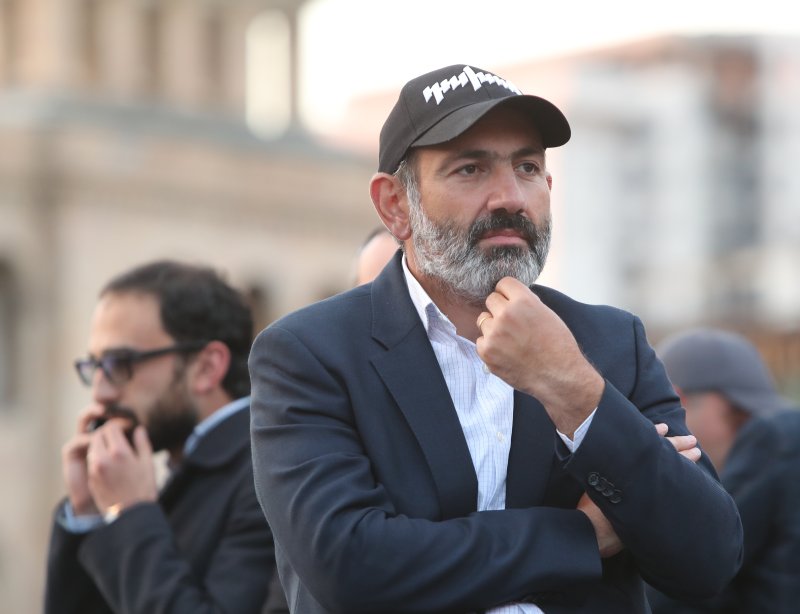1 of 2 | Armenian Prime Minister Nikol Pashinyan and his team have failed to engage the United States or European Union in any significant manner. File Photo by Zurab Kurtsikidze/EPA-EFE
Oct. 22 (UPI) -- When national security adviser John Bolton visits Armenia this week he will encounter a country undergoing a major constitutional crisis while inflaming "frozen conflict" in Nagorno-Karabakh.
Unfortunately, this crisis is not likely to have a democratic climax, even though it possesses profound implications for U.S. foreign policy interests. Democratic failure in Armenia undermines prospects for peace there and extends Russian influence in the Caucasus because peace and democracy go together in the Caucasus while war and despotism do so, as well.
Rather than grasp that continuing the war with Azerbaijan over Nagorno-Karabakh undermines any hope of democratization, Prime Minister Nikol Pashinyan has upped the rhetoric of Armenian nationalism, demanded an independent voice for Nagorno-Karabakh in the negotiations that would stop them in their tracks and has increased the defense budget, seemingly displaying an intention to further militarize this conflict.
Pashinyan and his team have also failed to engage the United States or European Union in any significant manner. Instead, he has endlessly and repeatedly stressed his support for Russia, even to the extent of sending a "humanitarian delegation" to Syria, and has reaffirmed the importance of relations with Iran. Thus he has antagonized the states that could support Armenia and help defend it against Moscow.
Yet none of these moves have eased Armenia's relations with Russia. So absent Western support, Armenia remains vulnerable to Russian suspicions of any reforms and vulnerable to Muscovite coercion. If it so desires, it can quash reform by many means, not the least of which is to weigh in decisively on behalf of its network of supporters from the old regime. Consequently, Pashinyan has made numerous visits to Moscow to reassure Russian President Vladimir Putin, including an impromptu one earlier in October.
Yet it is quite clear that he and his team have failed to obtain Russian support for their reforms even though he has wasted his opportunities to forge closer ties with Europe and the United States.
Domestically, he has fared no better, directly provoking a head-on crisis with supporters of the old regime without expanding the democratic base or obtaining Western support. On Tuesday, Pashinyan resigned, thereby attempting to force snap elections should Parliament fail twice to nominate a new prime minister. While he will place his name forward, Pashinyan aims to not be elected. He believes an election will engender a new Parliament that ousts members of the old regime that was overthrown by the May 2018 revolution.
Yet despite choosing the electoral route, Pashinyan has given ample warning that he does not believe in a constitutional government that is accountable to the law. Instead, he has made numerous statements to the fact that he embodies the will of the people and that Parliament's legitimacy is based on that will.
Likewise, all state institutions must consist of the people's will. Addressing a huge crowd in August, he stated that, "In Armenia, there is no coalition government. In Armenia, there is no parliamentary majority. In Armenia, the ultimate power directly belongs to the people and the people carry out direct rule. This is the key meaning of the revolution that took place in Armenia."
And he called this crowd the "supreme body of the people's rule."
"This means that from now on, this government will be accountable to this square, will obey this square and all key decisions must be made here at this square."
This is populism at its most anti-democratic and evokes memories of Juan Peron or Hugo Chavez, hardly democratic icons. Similarly he has failed in his efforts to expand his democratic base or to circumvent the holdovers of the old regime, failures that have evidently eroded his popular support. Pashinyan's belief that he is above the law has led him to try and force his opponents out through extra-legal means, e.g. arresting former Prime Minister Robert Kocharyan for suppressing demonstrations on March 1, 2008 that led to the proclamation of a state of emergency, an action that was found to be legal under Armenian law.
This arrest so blatantly flouted the law that two weeks later the government had to release Kocharyan, making it look like Pashinyan is conducting a vendetta rather than actually building a democratic state.
Therefore, it is not so surprising that Pashinyan has elected to force the issue and provoke a constitutional crisis by sacking governors, trying to disband Parliament and advocating snap elections. Yet by failing to expand his base, he remains vulnerable to obstruction from old regime holdovers and Moscow's men in Armenia.
Moreover, given this rather dismal record since May, it is conceivable that the elections will not give Pashinyan what he wants. In that case, can we be confident that he will accept the ensuing stalemate or unresolved tension? Given the views he has articulated to date, we cannot be optimistic that Pashinyan is truly committed to constitutional government under law with due process and governmental accountability as pillars of the system.
If this revolution fails to lift Armenia out of the morass of corruption and war bequeathed to it by previous rulers, not only it but its neighbors will continue to suffer from the threat, if not the actuality, of war, while the cause of democratic government and U.S. interests will suffer another defeat.
Stephen Blank, an expert on Russia and the former Soviet Union, is a senior fellow at the American Foreign Policy Council.















